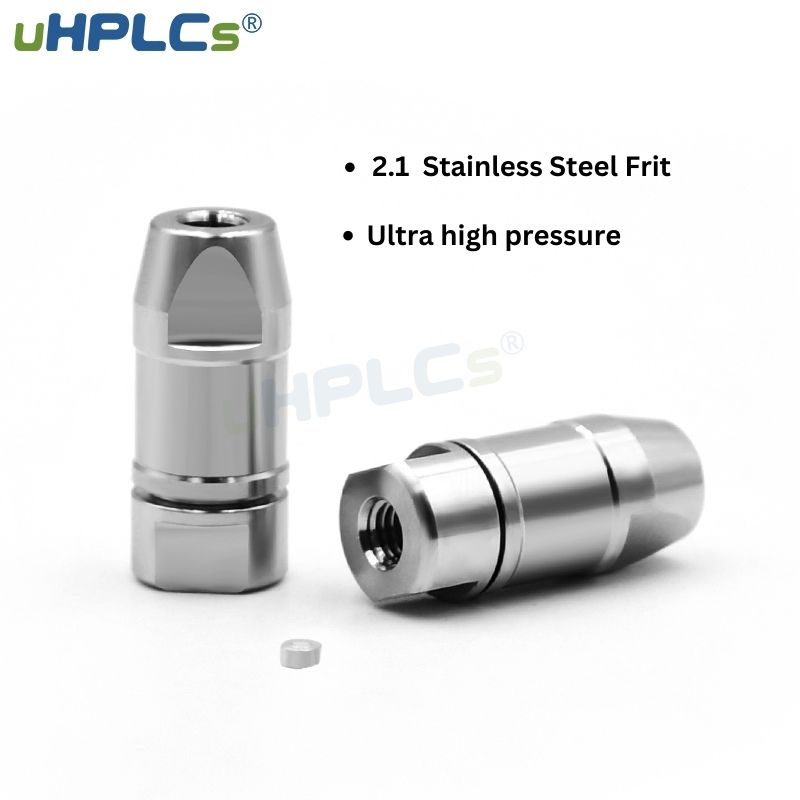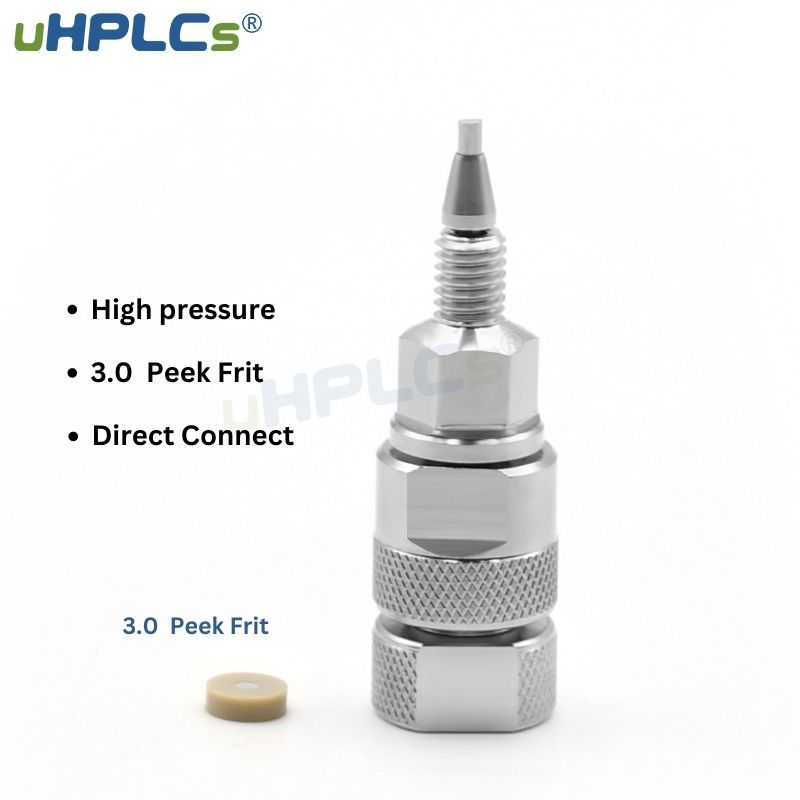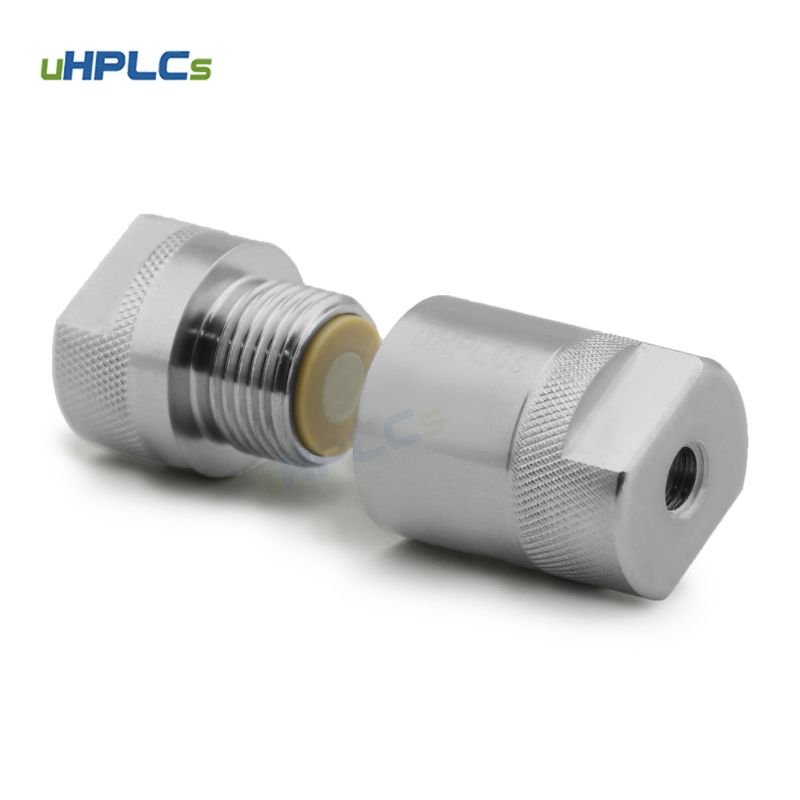Analytical HPLC Inline Filter
Home » Analytical HPLC Inline Filter
Analytical HPLC Inline Filter OEM Supplier
As a scientist or researcher, you know how important it is to obtain accurate and precise results. One way to ensure sample cleanliness and purity is to use analytical HPLC inline filters. But what exactly is an analytical HPLC inline filter, and why is it important? In this article, we explore the benefits of using this device in your lab.
So, what are analytical HPLC inline filters? In short, it is a filter that plugs into the sample line of an HPLC instrument and removes unwanted particles and contaminants from the sample. This means you get higher sensitivity and better reproducibility of results.

Using analytical HPLC inline filters is also an excellent way to extend column lifetime. By reducing the amount of debris that enters the column, filters help prevent clogging and ensure the column operates at peak efficiency. Plus, it helps reduce downtime for column maintenance, saving you time and money in the long run.
Another advantage of using analytical HPLC inline filters is that it can help you achieve compliance with regulatory requirements. Many industries, including pharmaceuticals, require strict compliance with regulations and guidelines. Using filters helps ensure that your results are accurate and free of any interfering substances, meeting the standards set by regulatory agencies.
In summary, using analytical HPLC inline filters is a simple and effective way to improve the accuracy and reproducibility of results, extend column lifetime, and comply with regulatory requirements. If you are interested in purchasing analytical HPLC in-line filters, be sure to select the filter that meets your specific application requirements.
* Economical method to prolong column lifespan
* Interchangeable filter component
* Minimal impact on column efficiency
* Compatible design, attaches directly to the column
* Secure sealing up to 15,000 PSI
Contact Us For Excellent Service
Proin ullamcorper pretium orci. Donec nec scelerisque leo. Nam massa dolor imperdiet nec consequata congue idsem. Maecenas malesuada faucibus finibus.
Main Features
Analytical HPLC Inline filters are an essential part of a high performance liquid chromatography (HPLC) system. They play a key role in ensuring that samples are free of contaminants and that HPLC columns remain unimpeded, resulting in reliable and reproducible chromatography. The following are some characteristics of analytical HPLC in-line filters:
High Pressure Rating:
Analytical HPLC inline filters are designed to withstand the high pressure levels typically encountered in HPLC systems. These filters can withstand pressures up to 6000 psi, ensuring smooth sample flow through the system without any pressure-related issues.
High Filtration Efficiency:
Analytical HPLC inline filters are designed to provide high filtration efficiency to remove particulates and other contaminants that can interfere with HPLC column performance. These filters typically have a pore size of 0.2 µm to 5 µm, depending on the application, and ensure that the sample is free of any unwanted particles.
Compatibility with a wide range of solvents:
Analytical HPLC inline filters are compatible with a wide range of solvents used in HPLC, including aqueous and organic solvents. They are usually made of materials such as stainless steel, titanium or PEEK, ensuring they are chemically resistant and able to withstand exposure to different solvents.
Minimal dead volume:
Analytical HPLC in-line filters have minimal dead volume, ensuring that sample is not retained in the filter unnecessarily, which can lead to sample loss and peak broadening. Low dead volume ensures that the filter does not adversely affect chromatographic resolution.
Easy to install and replace:
Analytical HPLC in-line filters are easy to install and replace, facilitating routine maintenance of the HPLC system. Most filters come with a simple threaded connection, which makes installation and replacement very simple.
Low extractables:
Analytical HPLC in-line filters are low in extractables, ensuring they do not contaminate samples. They are usually made from materials that are tested and certified to be low in extractables.
Long Life:
Analytical HPLC inline filters have a long life, providing reliable and consistent performance over an extended period of time. With proper maintenance and care, these filters will last for years, keeping your HPLC system in top condition.
Overall, analytical HPLC inline filters are a critical component of an HPLC system, ensuring the accuracy and reliability of chromatographic data. Their high pressure rating, filtration efficiency, compatibility with a wide range of solvents, low dead volume, ease of installation and replacement, low extractables, and long lifetime make them essential for maintaining HPLC system performance.
Country Export
0
Production Area
0
Staff
0
Low MOQ
0
Production Time
0
Effective OEM Service
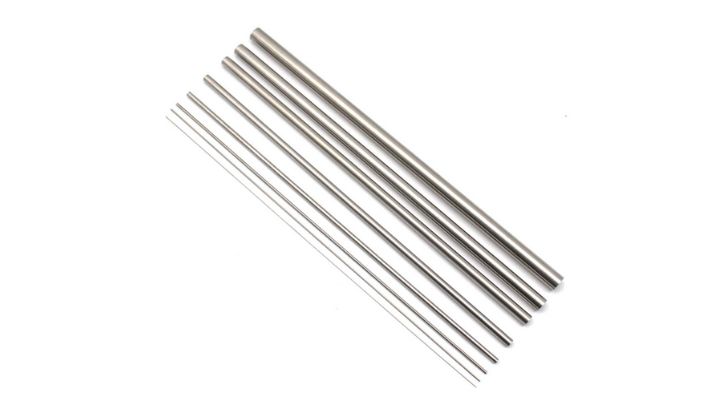
High Quality HPLC Column 316L, 316 Stainless Steel Tube Materials

Design New HPLC Columns 100% As Clients Request

Make HPLC Column Samples And Test Before Mass Products.
What Clients Say
The uHPLC's Analytical HPLC Inline Filter has drastically improved the quality and accuracy of our analytical results. The filter effectively removes any impurities or contaminants that may affect our readings.
Amanda LeeCEO 
With the uHPLC's Analytical HPLC Inline Filter, we have been able to extend the lifespan of our chromatography columns. The filter prevents any unwanted particles from reaching the column, which reduces the need for frequent column replacements.
Adam CheiseDesigner 
Since implementing the uHPLC's Analytical HPLC Inline Filter, we have noticed a significant improvement in the reproducibility and consistency of our analytical results. The filter ensures that our samples are always filtered the same way, which eliminates any variability in our measurements.
Floyd StallerCo-Founder 
The uHPLC's Analytical HPLC Inline Filter is incredibly easy to install and use. We were up and running in no time, and the filter has been a reliable addition to our laboratory equipment.
Adam CheiseDesigner 
We highly recommend the uHPLC's Analytical HPLC Inline Filter for anyone looking to improve the quality and accuracy of their analytical results. The filter is a cost-effective solution that provides significant benefits to any laboratory that uses HPLC equipment.
Amanda LeeCEO 
Previous
Next
Need Help ?
Contact uHPLCs Today for Any Questions for HPLC / UHPLC
+(86) 0755-28502380
sales@uhplcs.com
Contact Us
Recent Posts
Types of HPLC Solvent Filters and How to Choose
Introduction In High Performance Liquid Chromatography (HPLC), the purity of solvents is paramount for achieving
HPLC Prep HPLC Columns Full Guide
High-performance liquid chromatography (HPLC) is a workhorse technique in labs worldwide, separating complex mixtures into
HPLC Applications in Pharmaceutical Industry
Pharmaceutical industry:
Analytical HPLC inline filters are widely used in the pharmaceutical industry for drug analysis, formulation development and quality control. These filters play a key role in ensuring that the final product is free of any impurities or contaminants that could harm patients. By removing unwanted particles from the sample, the filter enables accurate and reliable analysis of active pharmaceutical ingredients and impurities.
Food and beverage industry:
In the food and beverage industry, analytical HPLC inline filters are used to analyze the chemical composition of food and beverage products. Filters help remove unwanted particles such as food additives, preservatives and other contaminants that can affect the taste and quality of your product. This enables manufacturers to ensure their products meet regulatory requirements and maintain a consistent level of quality.
Environmental Analysis:
Analytical HPLC inline filters are also used for environmental analysis such as water and air quality testing. These filters help remove any particles or contaminants that may interfere with contaminant analysis or other environmental factors. This allows researchers to obtain accurate and reliable data on environmental conditions in a specific area.
Biochemical Research:
In biochemical research, analytical HPLC inline filters are used to remove impurities and contaminants from biological samples such as proteins, peptides, and nucleic acids. These filters help ensure that samples remain pure and free of any contaminants that could affect the accuracy of the analysis. This enables researchers to obtain reliable data on the structure and function of biomolecules.
Petrochemical industry:
The petrochemical industry uses analytical HPLC inline filters to analyze petroleum products for quality control and compliance. These filters help remove unwanted impurities such as sulfur, nitrogen and other contaminants that can affect the performance and quality of petroleum products. By ensuring the purity of the sample, the filter enables accurate and reliable analysis of the chemical composition of petroleum products.
Overall, Analytical HPLC Inline Filters are used in a large variety of industries where accurate and reliable analysis of samples is critical. Capable of removing unwanted particles and impurities from samples, these filters play a vital role in ensuring product quality and safety as well as the accuracy of research results.
Frequently Asked Questions
Duis condimentum nunc metus, maximus porta velit temporin. Intincidunt leo viverra, sodales ex eu, posuere purus. Duis in augue vestibulum, aliquet nulla vitae, tempus tellus.
An Analytical HPLC Inline Filter is a device that is installed in-line with an HPLC system to remove impurities and contaminants from samples before they are analyzed. The filter typically consists of a membrane or frit that allows the sample to pass through while trapping any unwanted particles or contaminants. The filter works by using a combination of size exclusion and adsorption to remove impurities from the sample.
Analytical HPLC Inline Filters can be used to filter a wide range of samples, including pharmaceuticals, food and beverage products, environmental samples, biological samples, and petroleum products. Essentially, any sample that requires the removal of impurities or contaminants before analysis can benefit from the use of an Analytical HPLC Inline Filter.
The frequency of filter replacement will depend on several factors, including the type and volume of samples being analyzed, the degree of contamination in the samples, and the specific filter being used. Some filters can be cleaned and reused, while others may need to be replaced after a certain number of uses or after a certain period of time. The manufacturer’s instructions should be followed regarding filter replacement.
Regular maintenance and monitoring of the filter are essential to ensure that it is working correctly. This includes monitoring the pressure drop across the filter, which can indicate when the filter is becoming clogged and needs to be replaced or cleaned. Additionally, regular testing of samples before and after filtration can help to ensure that the filter is removing impurities effectively.
Analytical HPLC Inline Filters are designed to be compatible with most HPLC systems. However, it is essential to ensure that the filter is compatible with the specific HPLC system being used and that it is installed correctly to avoid any potential issues or damage to the equipment. The manufacturer’s instructions should be followed regarding filter compatibility and installation.
The primary benefit of using an Analytical HPLC Inline Filter is the removal of impurities and contaminants from samples before analysis, which can improve the accuracy and reliability of results. Other benefits include increased sensitivity, reduced downtime due to instrument maintenance, and longer column life.
The main disadvantage of using an Analytical HPLC Inline Filter is that it can cause some degree of sample loss, which can result in reduced sensitivity. Additionally, the filter can become clogged over time, which can affect the flow rate and lead to increased back pressure. Regular maintenance and monitoring can help to minimize these issues.
While Analytical HPLC Inline Filters are primarily designed for analytical applications, they can also be used for preparative HPLC to remove impurities from samples before purification. However, the filter may need to be scaled up or replaced more frequently due to the larger volume of samples being processed.
While both Analytical HPLC Inline Filters and Guard Columns are used to remove impurities and contaminants from samples before analysis, they differ in their design and functionality. Guard Columns are typically packed with a stationary phase and are installed before the analytical column to protect it from sample impurities. Analytical HPLC Inline Filters, on the other hand, are installed after the column and are designed to remove impurities from the sample before it reaches the detector.
Can an Analytical HPLC Inline Filter be used for both reverse-phase and normal-phase chromatography?
Yes, Analytical HPLC Inline Filters can be used for both reverse-phase and normal-phase chromatography. However, it is important to ensure that the filter is compatible with the specific column and solvent being used to avoid any potential issues with compatibility or performance.
Hotsale HPLC Products
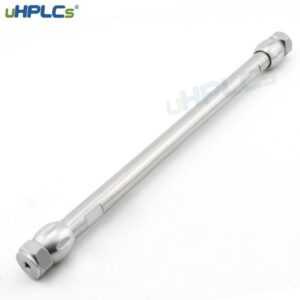
c18 hplc column 4.6 and 250mm
Previous slide Next slide USHD C18-Pro 5 µm 4.6 x 250 mm Unlock unparalleled robustness with the USHD C18-Pro HPLC column, where superior chemical resistance

50mm Empty HPLC Columns
Previous slide Next slide 50mm Empty HPLC Columns Wholesale and OEM Manufacturer Short Description: UHPLC Empty Column Hardware (Each column blank kit) includes a precision-bore

20mm Empty HPLC Columns
Previous slide Next slide 20mm Empty HPLC Columns 316L Stainless Steel Short Description: UHPLC Empty Column Hardware (Each column blank kit) includes a precision-bore polished
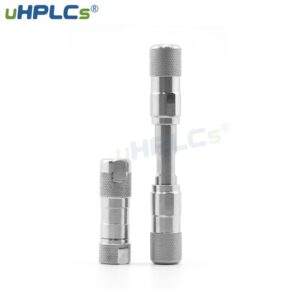
10mm Empty HPLC Columns
Previous slide Next slide 10mm Empty HPLC Columns 316L Stainless Steel Short Description: UHPLC Empty Column Hardware (Each column blank kit) includes a precision-bore polished
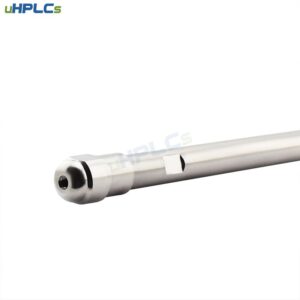
4.6mm Empty HPLC Columns 316L Stainless Steel
Previous slide Next slide 4.6mm Empty HPLC Columns 316L Stainless Steel Short Description: UHPLC Empty Column Hardware (Each column blank kit) includes a precision-bore polished
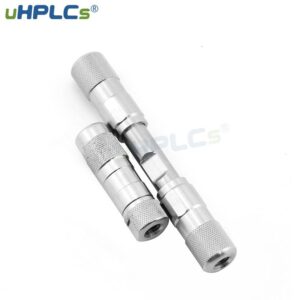
7.8mm Semi-prepared Empty HPLC Columns
Previous slide Next slide 7.8mm Semi-prepared Empty HPLC Columns HPLC Column Assembly, Empty, 150 mm/250/300 L x 7.8 mm ID x 1/4″ OD Short Description:


